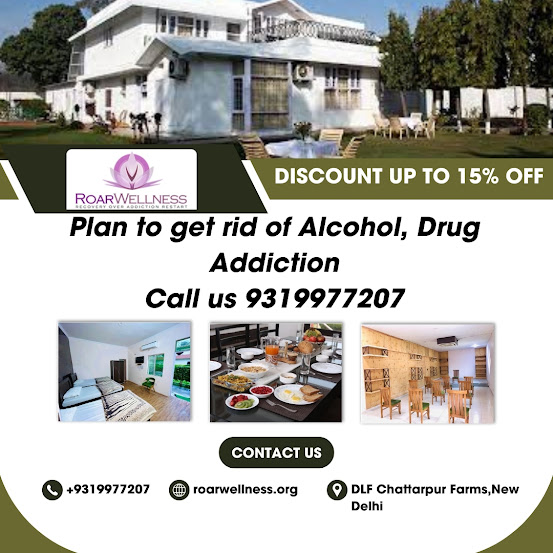Things to Expect at a Drug Deaddiction Centre in Delhi!
Drug addiction, or a substance use disorder, is a complicated brain disease that can drastically alter a person's life. This essentially alters brain chemistry & behavior, leading to compulsive drug use as well as seeking in spite of bad outcomes. The pervasiveness of drug addiction is a major problem globally, and in cities like Delhi, its increasing prevalence is seriously harming individual’s lives, families, & even communities. Addiction can have terrible repercussions, including deteriorating both physical as well as mental health, broken relationships, financial ruin, as well as legal issues.
For these individuals,
getting access to a reliable drug Deaddiction center in Delhi can change
their lives. The controlled, supportive, & medically monitored environment
that these facilities deliver is often challenging to replicate at home. They deliver
the tools, guidance, as well as counseling required to address underlying
problems, effectively manage withdrawal, & deliver the foundation for
sustained recovery. Clearly understanding what to expect in such a facility can
assist to alleviate treatment-related anxiety & demystify the entire process.
Well, these are the vital aspects
you can expect at any Drug Deaddiction Centre in Delhi:
1.
The Admission with Assessment
Process!
Your journey
often starts with a thorough admissions & evaluation process at any Drug
Deaddiction facility. This includes a comprehensive evaluation of your
physical, mental, as well as historical drug usage. Medical professionals will
conduct testing to ascertain the extent of drug use as well as any co-occurring
medical conditions. Counselors with therapists will assess your psychological
state concurrently, looking for any underlying mental health issues, which
often co-occur with addiction. This initial assessment is main point for generating
a customized treatment plan that addresses your particular needs.
2.
Medically Supervised
Detoxification
One of the first
& most crucial phases you will experience is detoxification under medical
supervision. This needs the safe management of the physical withdrawal symptoms
that occur when the whole body removes the addictive substance. Withdrawal
symptoms from some drugs can be quite uncomfortable & even dangerous if not
managed properly. In order to alleviate severe withdrawal symptoms, decrease cravings,
as well as ensure your comfort with safety during this complex period,
medication may be administered.
3.
Comprehensive Therapy &
Counseling
Even after detox
process, the central aspect of rehabilitation at a Drug Deaddiction centre
is comprehensive therapy with counseling. Multiple sessions of both individual &
group therapy will probably be mixed. Also, a more confidential environment is delivered
by individual therapy for the purpose to address personal issues, develop coping
mechanisms, as well as search into the root causes of drug addiction. Group
therapy assist you learn from others’ overall experiences & feel less alone
by allowing you to share your experiences with peers who are facing similar such
issues.
4.
Holistic Approaches &
Aftercare Planning
Many drug
addiction treatment centers also employ holistic tactics to enhance overall health.
In order to promote stress-reduction, emotional-balance, as well as physical
well-being, this could mainly involve mindfulness exercises, yoga, recreational
activities, meditation, or art-therapy. As therapy progresses, a lot of focus
is preferably placed on aftercare planning & relapse prevention. This eventually
means developing a strong support system, learning coping tactics for cravings,
as well as learning exactly how to identify triggers.
Summary:
So, going
ahead with a drug Deaddiction facility is more than just stopping drug as
well as it is about beginning a journey that will change your life as well as
lead to a healthier, more fulfilling life. The structured environment, medical
supervision, & comprehensive therapeutic interventions of a reputable
center can deliver an invaluable opportunity for long-term recovery.




Comments
Post a Comment